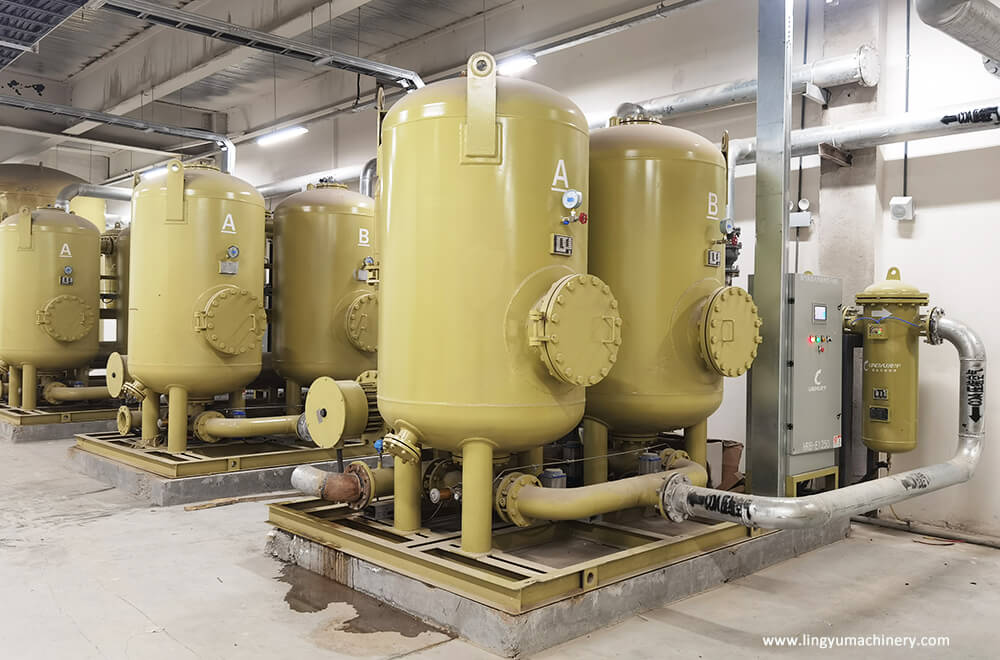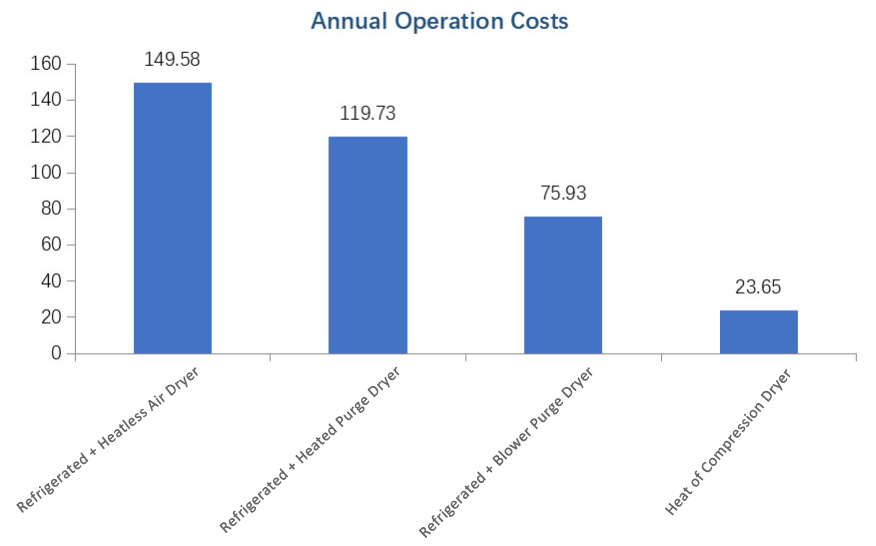The desiccant dryer is a deep water removal equipment. It is indispensable for many industrial processes. Only adsorption dryers can reach the air quality of ISO 8573 class 1, 2, 3. Therefore, the correct selection is crucial. How do we choose a desiccant air dryer? Below, we will have a general understanding of it. Then analyze in detail how to select the type.
It is different from a refrigeration dryer. This dryer uses desiccant pellets to adsorb water in compressed air. Its pressure dew point is much lower than the refrigerant dryer. The common dew points are -20℃, -40℃, -70℃. That is, -4℉, -40℉, -94℉. Usually, it consists of 2 adsorption towers. That’s why it is also called a twin-tower air dryer. The system and valves control adsorption dryers. The two towers automatically switch and circulate the work.
What Are The Common Desiccant Beads?
There are 3 kinds of adsorbents commonly used in dryers. Namely activated alumina, molecular sieves, and silica gel.
Among them, alumina is the most common type. Generally, it is a white ball of 3~5mm. Its surface hardness and compressive strength are very good. Pressure dew point can generally reach -20°C (-4°F). Molecular sieves are suitable for lower dew points. Its appearance is generally light brown. The water absorption capacity is stronger. However, it also has a disadvantage. That is, the compressive strength is not high. Therefore, the -40C PDP air dryer usually has two kinds of desiccants: alumina and molecular sieve. This combines their performance advantages.
The last one is silicone. It has the highest adsorption capacity. It is also particularly suitable for high-intake air temperatures. So it is especially suitable for the compression of heat dryers. But it costs a lot more.
Desiccant Dryer Working Principle
Desiccant beads have an important property. That is, they adsorb water under high-pressure or low-temperature conditions. Vice versa. The dryer rightly takes advantage of this feature. The air dryer uses the principle of pressure swing adsorption. Increase the adsorption capacity of the desiccant pellets per unit mass. To achieve the purpose of deep drying compressed air. The system will automatically control the twin tower switching. To complete the process of adsorption and regeneration continuously.
Different air desiccant dryers have different working principles. Some also use the temperature swing adsorption principle. If there is no heater, the regeneration air consumption will be larger. On the contrary, the air consumption is much smaller. There are even zero air consumption dryers.

Types Of Desiccant Compressed Air Dryers
There are mainly four types of adsorption dryers. To choose the desiccant air dryer rightly, we must know the types.
Heatless Dryer: There is no electric heater on the machine. It only utilizes dry air to desorb moisture.
Heated Dryer: There is an electric heater. It heats the compressed air temperature. Thus, less dryer air is required for regeneration.
Blower Purge Dryer: It has an electric heater and a blower. The latter draws in ambient air. Then heat this air. Finally, use this hot air to desorb the moisture. Therefore, only tiny regeneration air is required. Of course, it is, except for a zero air consumption dryer.
Compression of Heat Dryer: Use the waste heat of the front-end air compressor to desorb moisture.
How Do You Size A Desiccant Air Dryer?
The air capacity of the adsorption dryer is not fixed. It will fluctuate according to the compressed air pressure. Assume there is the same machine. Under 5 bar pressure, it can handle the flow rate of 5m3/min. But under the pressure of 10 bar, it can handle the air volume of 6.5m3/min. Meanwhile, in summer, the ambient temperature is high. The moisture content of the air increases. The effect of desiccant beads will decrease. Therefore, we should consider the pressure and temperature correction factors when sizing the desiccant air dryers. Please see the table below.
Table 1: Pressure Correction Factor CFP
| Inlet Air Pressure | Bar | 5 | 6 | 7 | 8 | 9 | 10 |
| Pressure Correction Factor | CFP | 0.75 | 0.88 | 1 | 1.13 | 1.25 | 1.38 |
Table 2: Temperature Correction Factor CFT
| Intake Air Temperature | ℃ | 20 | 25 | 30 | 35 | 38 | 45 |
| Temperature Correction Factor | CFT | 1.2 | 1.1 | 1 | 1 | 1 | 0.75 |
Selection Calculation Formula:
desiccant air dryer size = actual air capacity ÷ (CFP × CFT)
Size = 10m3/min ÷ (CFP × CFT) = 10m3/min ÷ (0.88 × 0.75) ≈ 15.15m³/min.
Check the catalog and can choose our model LY-H120HX.
How To Choose The Best Desiccant Dryer For Air Compressor?
Selection needs first to determine the basic parameters of the dryer. Then compare the buy and operation costs. In addition, we also need to consider other factors such as size and material.
(1) Airflow
The rated flow of the adsorption dryer needs to match our air consumption. Only in this way can it ensure our air-use equipment’s normal operation. Please refer to the above “desiccant air dryer sizing”.
(2) Working Pressure
We need to select the dryer according to the actual working pressure. General industries only need atmospheric pressure. That is 6~10 bar. However, some industries need medium and high-pressure dryers. Such as blow molding, refrigeration, petrochemical, metallurgy, etc. These dryers require special customization. Our factory can be up to 90 bar.
(3) PDP Pressure Dew Point
When choosing a desiccant air dryer, PDP is a very critical parameter. It measures the drying effectiveness of the adsorption dryer. The lower the pressure dew point, the better the drying effect. Choose the desiccant air dryer if the PDP is lower than 0°C. Its common dew points are -20°C, -40°C and -70°C.
We need to determine the PDP according to industry requirements. For example, the microelectronic chip industry requires -70°C. Precision spraying needs -40°C. The powder product delivery requirement is -20°C.
(4) Material
Most industries have no requirements for dryer material. Carbon steel will meet the demand. However, some industries have strict requirements. For example, the medical, pharmaceutical, and food industries need stainless steel. This will ensure high air quality. Offshore platforms need 316 or 316L stainless steel. The purpose is to prevent corrosion. In addition, lithium battery production requires no copper and zinc elements. So, it also requires stainless steel dryers.
(5) Desiccant Beads
Our factory uses the best brand of adsorbents from China. They are highly cost-effective. The water removal performance is good. Therefore, the dew point is stable. However, some customers will have higher requirements. If you need UOP desiccant beads, we can also supply them.
(6) Air Compressor Dryer Size
The size of the double tower air dryer is generally relatively large. But some factories need more space. So it is inconvenient to install and use. At this time, you can choose a modular desiccant dryer. It’s much smaller in size. The effect of water removal is the same. The flow rate of our modular air dryer is from 1.5m³/min to 55m³/min. In addition, you can also choose a combined type air dryer. It integrates refrigerated dryers and adsorption dryers. The size is also greatly reduced.
(7) Air Consumption of The Desiccant Dryer
When we choose a desiccant air dryer, operation cost is also a key factor. Compressed air consumption in many industries is very high. For example, aluminum, metallurgy, steel, glass, and automation consume a lot of energy.
Generally, iron and steel enterprises are equipped with 2 to 9 centrifuge air compressor stations. Usually, the airflow is 100~300m/min. According to production needs, it is generally set below 1.3Mpa. Among them, 0.38MPa and 0.5Mpa are used for steel-making and continuous casting. 0.8MPa is for power/instrumentation. 1.3Mpa is used for the coal injection blast furnace.
Screw machine air pressure station generally has 2 ~ 8 machines. Most of the airflow is less than 10~40m/min. Screw compressors are mainly used as the auxiliary air source of the centrifugal air compressor.
Therefore, these industries urgently need to save energy. Let’s briefly compare the operating costs of different dryers.
Suppose there is a 200m3/min oil-free centrifugal air compressor. The energy consumption comparison of air compressor dryers is as follows:

We can see that the HOC dryer has the lowest energy consumption. And the blower purge dryer followed. HOC dryer and blower purge dryer are energy-saving. They include 2 types: zero gas consumption and micro gas consumption. It should be noted that: the HOC air dryer needs cooling water. Moreover, the inlet air temperature should not be lower than 110℃.
In addition, energy-efficient dryers are generally suitable for large flows. Otherwise, its energy-saving advantages could be more obvious. For example, the min flow of our HOC and blower purge dryers is 13.5m³/min.
Can Dew Point And Energy Saving Be Compatible?
As mentioned above, HOC and blower purge air dryers save energy. And can these two desiccant air dryers achieve very low dew points? The answer is no.
① Heat of Compression Dryer (HOC): It applies to centrifugal and oil-free screw compressors. The intake air temperature must be more than 110℃. Besides, the dew point temperature need is not particularly strict. At this time, its energy saving is beyond doubt.
But some customers have very strict requirements. For example, the PDP must be lower than -40°C. And they can’t ensure that the inlet temperature always reaches above 110°C. Then its energy saving will be greatly reduced. It is even better to choose a heated purge air dryer now.
② Blower Purge Desiccant Dryer: It has a wide range of applications. Besides, the pressure dew point can reach -40°C. However, it cannot reach lower dew points. At this time, it is recommended to choose a heated purge dryer.
Do I Need A Refrigeration Dryer Before Desiccant Air Dryer?
Yes. In cold regions, some customers do not use refrigerant dryers. In this case, the pressure dew point is generally not high, such as -20°C. This is fine. However, this is not acceptable for most regions.
Moreover, reaching -40°C PDP without a refrigerated dryer is often difficult. A refrigeration dryer can cool down the temperature and remove water. So it can greatly reduce the load of the adsorption dryer. Otherwise, a lot of moist air will enter the desiccant dryer. This will affect the drying effect of the adsorbent. It also reduces their service life.
In addition, this also makes the energy savings of heated and blower purge dryers less meaningful. Even they will consume more energy than a heatless dryer.
Conclusion
When we choose a desiccant air dryer, we can refer to the following steps. Firstly, inform the basic parameters (flow, pressure, PDP). Secondly, whether the material and size are required. Thirdly, inform the condition of the air compressor and refrigerated dryer. Fourthly, if the flow rate is low (such as 10 m³/min), recommended to choose the heated purge dryer. Fifthly, energy-saving dryers are the first choice if the flow rate is large.
Purchasing a desiccant dryer is a significant investment. It will directly affect your production efficiency and the quality of the final product. By combining your needs, quality, performance and budget, you will be able to make an informed buying decision. Choosing the right desiccant dryer will bring you long-lasting value and a satisfying experience. We recommend Lingyu desiccant dryer manufacturer to you. Because they are professional and experienced. Or if you have any professional questions, you can consult Lingyu.
